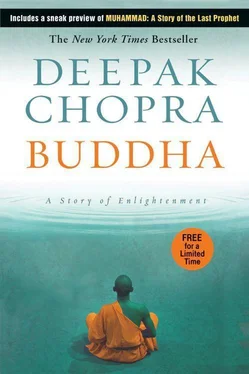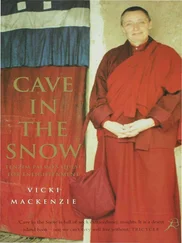Only the nobles were exempted, and those under strict conditions. Venerable figures like the astrologers were sworn never to be seen by Siddhartha at any time, under pain of banishment. Others not yet old could remain at home, but if they grew ill or aged, they would be confined under house arrest. All funerals would take place at night, without public ceremony. The burning ghats were moved two miles downriver. Suddhodana knew how to organize a battle campaign, and the first rule is that victory is more important than the costs it entails. This campaign would be no different.
Ruler of the four corners of the earth. He had memorized the words in the chart. How would that feel? he wondered. After three days the great wooden gates of Kapilavastu closed; the bitter cries of those who had to leave and those who had to let them go were silenced. The job was complete.
THREE WOMEN CHASED a small boy across the park. They ran over lawns kept immaculate by slaves on their knees with clippers, through gardens filled with flowering jasmine whose fallen blossoms were swept from the path every morning. It wasn’t a serious chase, but the boy, Siddhartha, pretended it was. When he sped up or took a sudden zigzag, his pursuers did too. But you didn’t have to be seven years old to notice that they never caught him.
Not only that, but the three women always ran in the same order. First came Prajapati in her gold-embroidered sari the color of peacock blue, although on other days it could be vermilion or emerald. Prajapati was the prince’s aunt, sister to his dead mother. Suddhodana had formally given her the status of a wife, but the two had no conjugal relations. The king was paying honor to her and acknowledging her role as stepmother to the prince.
The heavy gold bangles in her ears tinkled softly as Prajapati ran. Behind her came two peasant girls, considerably younger and slimmer than Siddhartha’s aunt. They wore coarse cotton saris with no embroidery, their ears had small silver bangles in them, and they slowed down enough so that Prajapati was always first.
“Channa, Channa!” The boy called out his friend’s name.
On days like today, when the sun was out and the morning air was cool, the world his father had built for him was big enough, and he didn’t wonder what lay beyond the high walls surrounding the palace grounds.
“Prince, stop!” cried one of the aunties.
“Oh, Prince, do come back!” another begged.
Siddhartha veered toward the stables. He wasn’t running away from the women for recreation. He had made a discovery that he wanted to show Channa. As long as he was supervised, the king allowed him this freedom. The stables were much better for a boy than a palace, anyway, and once he crossed the threshold, Siddhartha’s aunties always stopped short. Prajapati had never set foot in a stable, and although the peasant girls certainly had, their newfound station as royal servants prevented them from entering a precinct where only males belonged.
Hearing his name, Channa appeared at the stable door. He jumped and waved his fists, encouraging Siddhartha on. If it had been him racing the prince, he would have won easily, being taller and stronger despite the fact that they were born the same week.
Siddhartha dashed inside. “Hide!” he cried.
There was no need for him to be hidden from anybody. The rules of the chase were well known to all, but Channa grabbed Siddhartha by the arm and pulled him inside, as if hauling a fellow soldier to safety inside an armed fortress. The two boys raced past the stalls where warhorses were kept when in heat or giving birth to spring foals. Their heels kicked up clouds of dried dung that the sun turned into glowing auras around them.
“Here!” Channa led the way to a feed bin. It smelled of fresh hay with a sour undertone of rotted hay beneath. This was a favorite retreat since they could burrow as deep into the hay as they wanted to escape detection. Siddhartha perched on top of a nearby bale and reached into his pants. He pulled out a tiny creature.
Channa’s face fell. “It’s just an ant,” he said, disappointed.
“No, it isn’t. Look closer.”
The feed bin was dim, but now Channa saw that the insect, a large black soldier ant common around the stables, was still clutching its prey, a dead termite, in its jaws. The termite, which wore stiff papery wings, was newly hatched and twice as large as the ant.
“Where did you find it?” asked Channa, still unimpressed. But he saw that Siddhartha was excited.
“By the water fort.” This referred to one of the floating pavilions on the shore of a lotus pond in the park. “I saw the whole battle.”
The event had taken place that morning when Prajapati found Siddhartha wandering away from the palace. He was sitting on the ground beside the pavilion staring intently at the dirt. A string of black soldier ants was clashing with sentry termites at the entrance of a small colony.
Prajapati stopped a few feet away. “Who’s winning?” she asked.
“That doesn’t matter. It’s something else.”
Siddhartha was staring at a particular soldier ant carrying a dead termite in its jaws. The ant had reached an obstacle in its path, a large pebble. The pebble was five times the ant’s size, and it was already carrying a load twice its weight. For half a second the ant paused, then it started to climb up the pebble. The way was too steep and it fell back, but this was no deterrent. The ant climbed up again, fell back again, climbed up a third time.
“How foolish! It should just go around,” Prajapati said.
Siddhartha shook his head. “The mighty don’t go around.”
“Is an ant so mighty?”
The boy ignored her amused tone. “He thinks he is. That’s what counts.”
“I could step on him. Then how mighty would he be?”
At that moment the boy said something quite surprising. “God could step on my father, but he still thinks he’s mighty.”
Prajapati was nonplussed. “It’s not the same thing.”
“Why not?”
Siddhartha glanced at her with his wide brown eyes, eyes that had seemed twice the normal size when he was an infant. But before his aunt could reply, he returned to the ant, scooping it up in his hand. His whole attention was focused on it. “If you think you’re mighty, that’s all that counts. No one is really mighty.”
What a strange child you are, Prajapati thought, but she hid this from Siddhartha, saying, “I never thought of it that way.”
“What do you think?” he now asked Channa, having told him everything.
Without a word his friend shot his hand forward and pinched the black ant in half between two fingers. “I think we need to find a better game. That one’s no good.”
He shoved Siddhartha into the hay, and when the prince came up sputtering stalks of long grass, he shoved back. The boys’ tussle was interrupted. “Channa!” The boys looked up as if on command from the god of the stables.
Bikram appeared at the gate of the feed bin, his bulk almost filling it. He wore a thick leather apron and metal-fitted leggings, as he always did in mating season when a stallion could unexpectedly lash out with its hooves.
Stooping, Bikram picked up a clod of horse manure and flung it at the two peasant girls lingering at the stable door. Prajapati had left them to wait until Siddhartha emerged again. The girls squealed as the clod barely missed them; they had already started backing away. Siddhartha and Channa crowed in triumph.
Bikram wasn’t smiling. “I need you, boy.”
Channa ran after his father, who was the king’s stablemaster when there was no battle to fight. Not that there had been many since the birth of the prince. The kingdoms of Kosala and Magadha to the east had made peace with Suddhodana, and he had relinquished his need for raiding frontier villages to add to his domain.
Читать дальше












